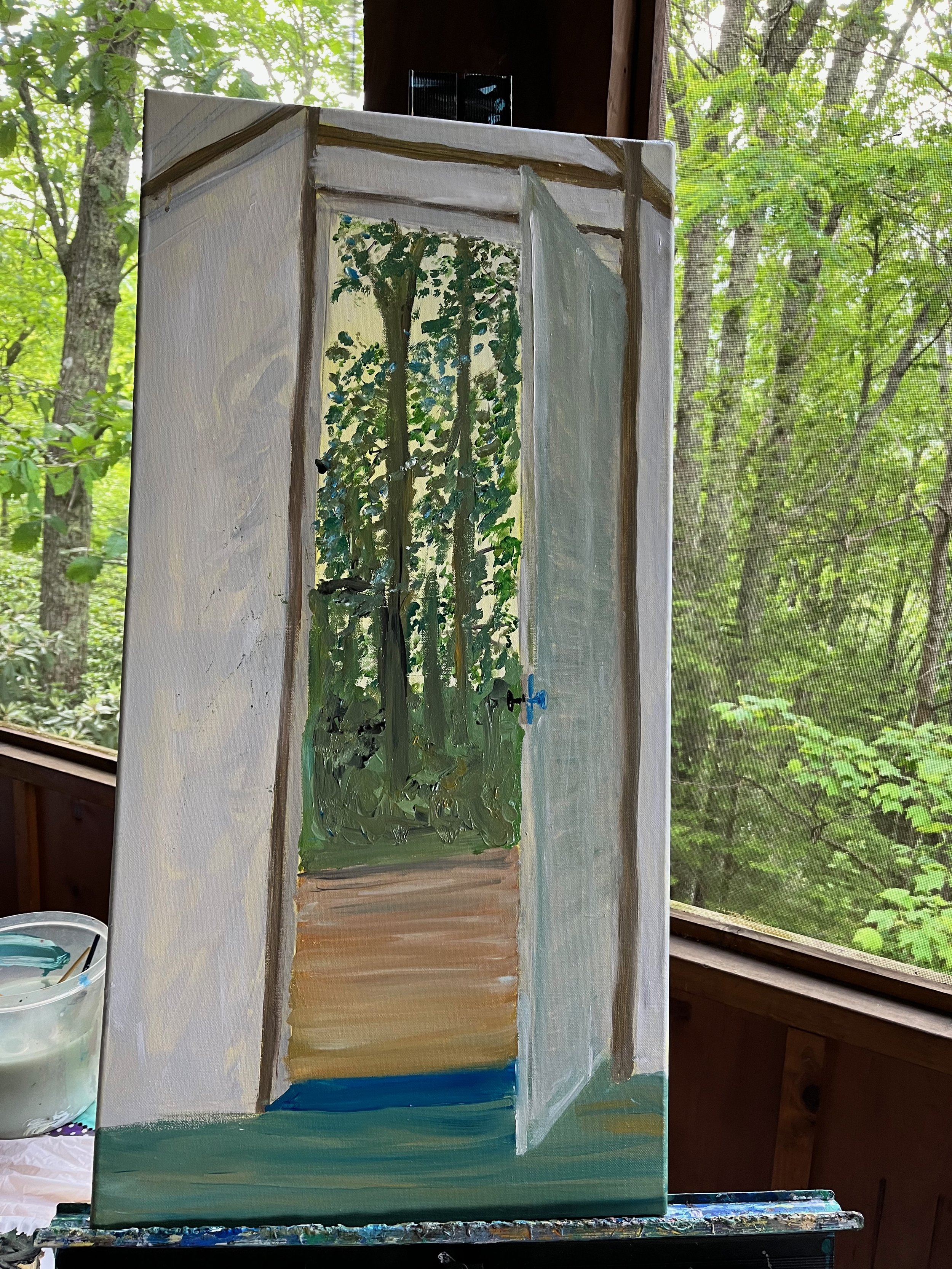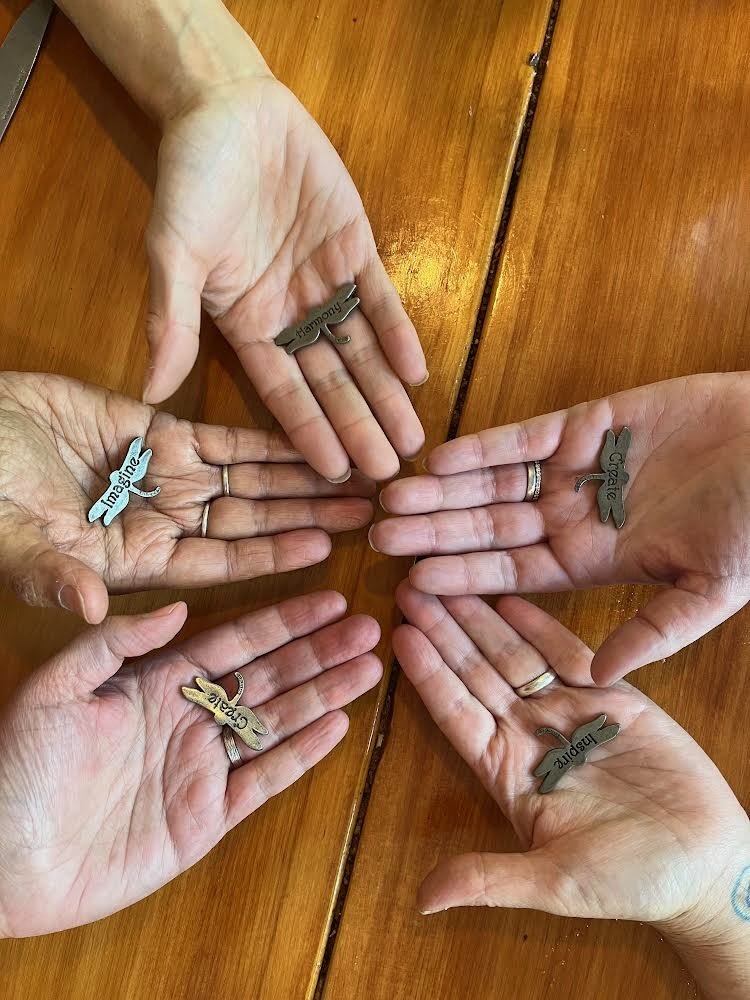The Creative Path: A Guided Group Experience in Art, Self-Compassion, and Renewal
Open the door and join us on the creative path… to renewal and and joy, as we move right on into summer!
The Creative Path: A Guided Group Experience in Art, Self-Compassion, and Renewal- an entry by Julie King Murphy
Helping others is a core value that shapes our callings—and for many of us in roles like counseling, teaching, coaching, healthcare, parenting, and community work, it’s more than a job. It’s a way of life. But it can also be exhausting. If you’ve ever felt like you’re pouring from an empty cup, you’re not alone—and this might be exactly the right moment to refill it.
This spring, my colleague Leigh Rainwater and I are thrilled to offer The Creative Path, a small-group experience designed for helping professionals and for those who help others as part of their personal lives, too. The program is open to anyone who wants to reconnect with creativity, self-compassion, and a sense of joy. We'll gather for four Tuesday evening sessions starting May 13 at the welcoming new ArtPlay-Studio space in Asheville’s Montford neighborhood.
Each session is a time to slow down, experiment with art (no experience necessary!), and engage with others who are also committed to living—and giving—with intention. You can choose to register for just one or two sessions, if that’s what works with your schedule, or join us for all four.
✨ The Essentials:
When:
Tuesdays, 4:30–6:30 p.m. — May 13, 20, 27, and June 3
Where:
ArtPlay-Studio, Montford area, Asheville
Cost:
$70 per session, or all four for $200 (includes all supplies!)
To register:
Follow this link or email me at Juliekingmurphy@gmail.com
Why Self-Compassion?
When I first encountered the term self-compassion, I was juggling a full-time job, raising young children, launching a business, leading small group retreats, and preparing to start graduate school in counseling and expressive arts therapy. Like so many helpers, I was good at being kind—to everyone but myself.
Practicing self-compassion changed my life. It gave me access to deeper energy, greater patience, and a fuller capacity to be present for others. Over the past 15 years, I’ve seen the same thing happen for my clients, my students—and honestly, I’ve had to re-learn it’s importance again and again myself. It’s not a one-time fix. It’s a practice.
What research (and experience) tells us is this: People who actively practice self-compassion are more resilient, forgiving, and motivated. They have better relationships, cope more effectively with stress, and show greater long-term well-being. And yes—self-compassion helps us help others better.
(For more, check out Dr. Kristin Neff’s work at self-compassion.org.)
Creativity as a Path to Healing and Connection
The good news? You don’t have to meditate for hours or read piles of books to practice self-compassion. Sometimes, all it takes is bringing together some art materials and an idea for a process to try, sitting down with a few other people (or even just yourself), letting go of judgment, and seeing what wants to emerge.
Art-making gives us permission to play. To explore. To make mistakes and grow from them. It’s a surprisingly powerful way to reconnect with ourselves and each other. Whether you're writing a poem, making a collage, painting with your fingers, or shaping clay—when approached with gentleness, creativity becomes a kind of medicine.
Each session of The Creative Path will include:
Two guided art processes (think: journaling, collage, drawing, painting, clay sculpting…)
Gentle body-based or mindfulness practices to ground us
Time to share and connect, or simply reflect quietly, as you prefer
This isn’t therapy. It’s not about performance or technique. It’s about exploration, self-kindness, and discovering joy and meaning in the creative process. No artistic experience is required—just a willingness to be curious and kind to yourself.
A Little Backstory
Leigh and I have been supporting each other in our own creative self-care for the last couple of years—often meeting weekly with one or two others to make art and other times identifying what spaces and pockets of time we could find, even after the original ArtPlay-Studio location was destroyed by Hurricane Helene. That shared commitment—and the friendships that grew from it—helped us through tough times, and ultimately inspired the timing and theme of this particular program.
The new ArtPlay-Studio location is warm, light-filled, and often buzzing with creative community. It feels like the perfect place to host this next chapter—one grounded in creativity, compassion, and connection. As the studio's founder, Kristen Edge, often says: "Art is for everyone." We couldn’t agree more.
Ready to Join Us?
Whether you come for one session or all four, we’d love to welcome you to this space. Come as you are. Bring your curiosity. Leave perfectionism at the door.
To register or ask any questions, email me at Juliekingmurphy@gmail.com. Payment options include Venmo, PayPal, or Zelle—and if the timing doesn’t work but you’re interested in future offerings or individual sessions, please reach out. We’d love to stay connected.
Here’s to choosing creativity. Here’s to being our own friend.
We hope to see you soon on The Creative Path.
Growing larger than this
I was discussing spring equinox with a friend the other day. “I feel I am being asked to be in winter and spring all at once,” she mused. “I feel stretched to capacity.”
That’s exactly what this moment feels like, to me. Stretched to capacity. Attempting to bridge impossible extremes, trying to adjust to the darkest dark and the brightest light all at once, aware of every extreme inherent to humans.
And after the stretch—if we survive it without pushing ourselves past capacity—we are just a little larger than we were before. A little more limber, a little more flexible. That’s the idea, anyway. Carl Jung once observed: “The greatest and most important problems of life are all fundamentally insoluble. They can never be solved but only outgrown.”
And Rilke weighs in (translated by Robert Bly): “This is how we grow: by being defeated, decisively, by constantly greater beings.”
It can help us in these moments of being strapped, stretched, pulled, to recall this. To recall that, if we can resist the urge to split and polarize, if we can just hold the tension here, we will be a little larger than before. A little less tight. A little more open.
When the stretch begins to hurt, it’s very tempting to shut down. But just as we can hurt ourselves by forcing the stretch too open or too soon, we can also hurt ourselves by retreating and putting our existential muscles into a state of contraction. If we allow the intensity to contract us, we have been defeated by something smaller than we are.
But if we can withstand the intensity of the stretch without shutting down, we might find an increased capacity on the other side. We might become acquainted with parts of ourselves that are, surprisingly, equal to the task at hand. That’s being defeated by something larger than your current self. Then, larger, you may find yourself capable of building the world you wish to live in. Action binds anxiety—it is a very specific kind of self-care when you take action on your values.
That’s not to say that any of this is simple, or easy. It hurts to grow larger. It can be painful, overwhelming, exhausting. I have found it helpful to remind myself that both sides of this stretch are true. The world is a very scary, very painful, very cruel place. And the world is a joyous, impossibly creative hive of beauty. Any truth less than any of that is too small for my experience. To have any of it, I have to stretch large enough for all of it.
Here’s a guided meditation that I’ve found helpful when life is asking me to grow larger.
We can grow larger than this. But to grow larger, we have to accept that things truly are as they are. We can’t avoid them or inch past them. We have to include them, then transcend. Any previous version of ourselves is too small if it doesn’t include the present experience, even if the present experience is uncomfortable or unwanted.
Whatever comes next for you, may it be gentle and safe enough for the most wounded part of you and courageous and spectacular enough for the bravest part of you. We need each other—the largest, most flexible versions of ourselves that we can be.
If you find story, dreamwork, and community helpful in the endeavor of growing larger, you may be interested in these upcoming events. These events will be limited in size to create safety and intimacy, and will be in-person only. If you are not local to the Asheville area and would be interested in an online version of these experiences, reach out to me at innerlightasheville@gmail.com.
How Not To Spin Out When The News Is Very Bad
By Lissa Carter, LCMHCS













